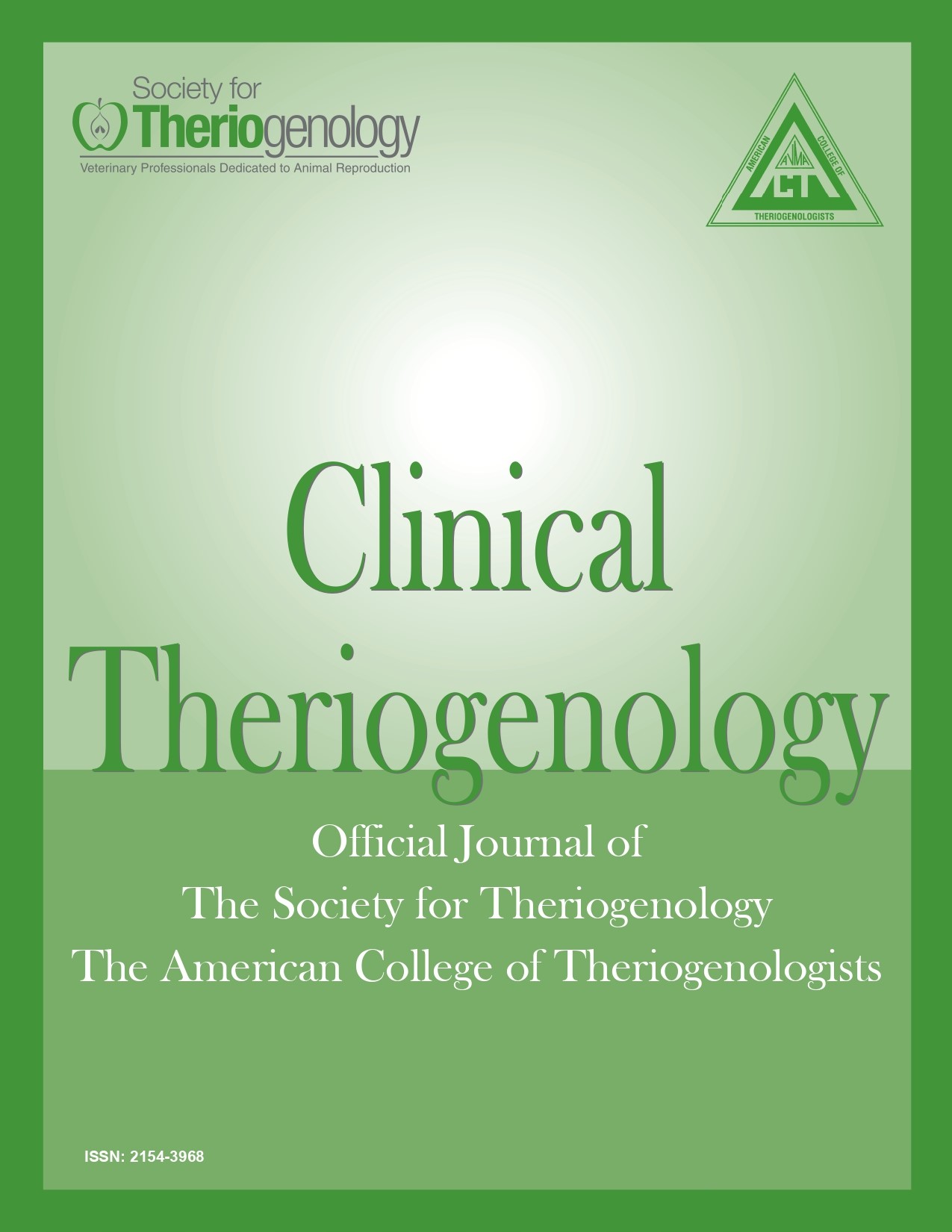A case of impaired fertility in a Large White boar with sex chromosome chimerism
Abstract
Chromosomal abnormalities are a well-established cause of fertility impairment in domestic animals. Chromosomal abnormalities in pigs may result in low prolificacy and subsequent reduction in reproductive parameters (e.g. litter sizes and nonreturn rates) having substantial impact on swine industry. Until now, the effect of sex chromosome abnormalities on fertility has not been thoroughly documented for male pigs. We report a case study involving a Large White boar with sex chromosome chimerism (2n = 38, XX/XY) identified by conventional karyotyping and fluorescence in-situ hybridization. Progeny of this boar was evaluated; there was reduction (p < 0.001) in litter size demonstrating the potential impact of sex chromosome chimerism on herd productivity in pigs.
Downloads
References
2. O’connor RE, Kiazim LG, Rathje CC, et al: Rapid multi-hybridisation fish screening for balanced porcine reciprocal translocations suggests a much higher abnormality rate than previously appreciated. Cells 2021;10:1-7. doi: 10.3390/cells10020250
3. Quach AT, Villagómez DAF, Coppola G, et al: A cytogenetic study of breeding boars in Canada. Cytogenet Genome Res 2010;126:271-280. doi: 10.1159/000251964
4. Villagómez DAF, Parma P, Radi O, et al: Classical and molecular cytogenetics of disorders of sex development in domestic animals. Cytogenet Genome Res 2009;126:110-131. doi: 10.1159/000245911
5. Lewis NM, Rathje CC, Canedo-Ribeiro C, et al: Incidence, reproductive outcome, and economic impact of reciprocal translocations in the domestic pig. DNA 2021;1:68-76. doi: 10.3390/dna1020007
6. Kozubska-Sobocinska A, Smołucha G, Danielak-Czech B: Early diagnostics of freemartinism in Polish Holstein-Friesian female calves. Animals 2019;9:1-11. doi: 10.3390/ani9110971
7. Brace MD, Peters O, Menzies P, et al: Sex chromosome chimerism and the freemartin syndrome in Rideau Arcott sheep. Cytogenet Genome Res 2008;120:132-139. doi: 10.1159/000118752
8. Szatkowska I, Zychi S, Udała J, et al: Freemartinism: three cases in goats. Acta Vet Brno 2004;73:375-378. doi: 10.2754/avb200473030375
9. Szczerbal I, Nowacka-Woszuk J, Dzimira S, et al: Elevated incidence of freemartinism in pigs detected by droplet digital PCR and cytogenetic techniques. Livest Sci 2019;219:52-56. doi: 10.1016/j.livsci.2018.11.009
10. Barasc H, Ferchaud S, Mary N, et al: Cytogenetic analysis of somatic and germinal cells from 38,XX/38,XY phenotypically normal boars. Theriogenology 2014;81:1-5. doi: 10.1016/j.theriogenology.2013.10.006
11. Padula AM: The freemartin syndrome: an update. Anim Reprod Sci 2005;87:93-109. doi: 10.1016/j.anireprosci.2004.09.008
12. Dunn HO, Mcentee K, Hall CE, et al: Cytogenetic and reproductive studies of bulls born co-twin with freemartins. J Reprod Fertil 1979;57:21-30. doi: 10.1530/jrf.0.0570021
13. Rezaei S, Donaldson B, Villagomez DAF, et al: Routine karyotyping reveals frequent mosaic reciprocal chromosome translocations in swine: prevalence, pedigree, and litter size. Sci Rep 2020;10:1-9. doi: 10.1038/s41598-020-64134-w
14. Quach AT, Revay T, Villagomez DAF, et al: Prevalence and consequences of chromosomal abnormalities in Canadian commercial swine herds. Genet Sel Evol 2016;48:1-7. doi: 10.1186/s12711-016-0246-5
15. Sell-Kubiak E: Selection for litter size and litter birthweight in Large White pigs: maximum, mean and variability of reproduction traits. Animal 2021;15:1-10. doi: 10.1016/j.animal.2021.100352

This work is licensed under a Creative Commons Attribution-NonCommercial 4.0 International License.
Authors retain copyright of their work, with first publication rights granted to Clinical Theriogenology. Read more about copyright and licensing here.





